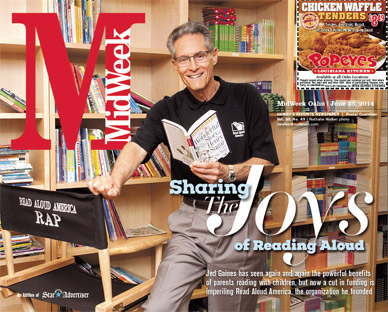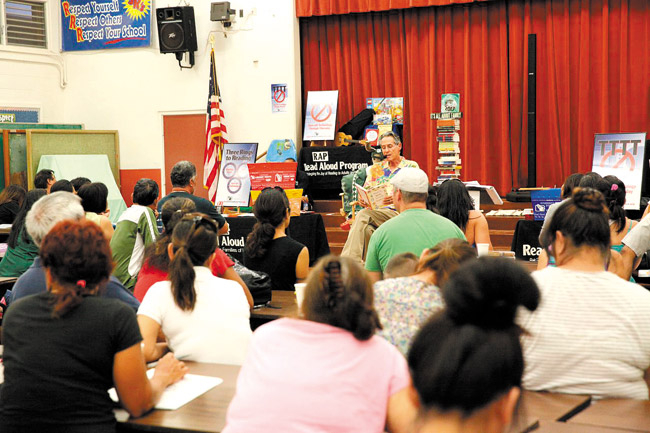Sharing The Joys Of Reading Aloud
Jed Gaines has seen again and again the powerful benefits of parents reading with children, but now a cut in funding imperils Read Aloud America, the organization he founded
Jed Gaines loves reading. He really loves reading. Like an evangelist loves the Lord, like a Labrador craves the water, that is Gaines to a book. Just take five minutes to talk to him and he will have you convinced that reading is the panacea for all the world’s problems.
mw-cover-062514-jedgaines-3
This kind of passion can be off-putting, if you disagree with it. But who can argue against reading? No one at MidWeek.
His fervor led to forming Read Aloud America program (RAP), a grassroots organization that simply encourages families to read together and has become the largest attended program in the state of Hawaii, with more than 300,000 parents in 82 schools attending since 1999.
But a passion like this comes with deep roots, and Gaines’ run back to elementary school, where reading was not just hard for him — it was impossible.
“I am severely dyslexic in all three modalities: kinesthetic-motor, auditory and visual. I didn’t learn to read a book until seventh grade,” says Gaines, who to this day is not certain how he passed all those grades while being so severely impaired.
“I was going to become a dad for the first time in 1984. I knew there was a 50/50 chance my kids would have learning differences — not disabilities, differences. So I went to the state library and asked the librarian what I could do to help my children if they had dyslexia. She gave me the Read Aloud handbook and I read it, and said it’s too simple — it can’t be that easy.”
Yet it was.
The handbook, written by Jim Trelease, outlines the importance of sitting and reading together with your children. So Gaines tried it first with his son and then his daughter, with amazing results. A convert was born.
“If I am doing it for my kids, whom I love, why can’t I do it for other kids?” says Gaines, who was running the cleaning service Apartment Appearance before he started Read Aloud America in 1995.
After receiving encouragement and permission from former DOE district superintendent John Sosa, they began a pilot program with volunteers reading to kids at lunchtime. The volunteers came from all walks of life, and the kids really enjoyed it, but something did not seem right to Gaines.
The epiphany he needed came to him while he was climbing the Matterhorn in Switzerland (we never said reading was his only passion).
“The big piece that we are missing here are the parents,” says Gaines, who actually served as a hiking guide in the Alps for several summers. “Kids are in school 900 hours a year and at home 7,800 hours a year. Until you change the attitudes and values in the home, you will never change our schools, our communities or our nation. They keep blaming the schools for all the problems. It is not the schools — it is the home.”
So he changed the emphasis of the program. Instead of having volunteers read to the kids, he would bring in the whole family to read together.
“We do not teach people how to read; the schools do a great job of that,” says Gaines, whose program is the largest family literacy program in the country. “There are no tests, no book reports. It is simple, it is free and it is fun.”
Fostering this partnership as the key to fixing our education system is the central tenet for both Gaines and Trelease.
“If there is a ‘traffic jam’ on the road to school improvement, it’s the bridge between home and school,” writes Trelease, whose handbook has sold more than 1 million copies, in a letter praising Gaines’ program.
“By improving the curriculum of the home, the chances of improving the child’s school performance are six times greater than if only the classroom is improved. How families spend that 7,800 hours makes the big difference.”
The testimonials Gaines has received attest to this, as families write to him about the changes the program has made in their lives.
“This program has been great in promoting a love of reading in my first-grader,” writes Shelby Cotham. “He always liked reading, but now he thinks books are ‘cool.’ He would rather have a new book than a new candy.”
The impact is not just seen in the kids.
“I’m 30 years old and never had a love of reading my entire life,” writes Cheyni Webster. “I read to my son at bedtime, but would never pick up a book myself. Since starting RAP, I have found an author I like and can’t put the books down.”
Gaines has stacks of these letters, as one could expect, having had an influence on a third of the state’s population, but his sway is lessening in recent years, as the state has recently cut all the program’s funding.
“I have four sessions set up for the next school year, but I don’t know how we are going to pay for them,” says Gaines, who now urgently is looking for supporters.
One of these sessions is for Linapuni School, which has many at-risk students who could benefit greatly from Gaines’ message. School principal Cindy Sunahara has seen firsthand the impact that RAP can have.
“The program is important to low-income areas, because the program emphasizes the importance of literacy in a fun and engaging activity,” says Sunahara, who had 397 people attend the school’s last session in 2010, and that was with a school enrollment of 230.
“At a small school, we do not have the resources to replicate the program, even on a smaller scale. The business-partner donations, VIP readers and communication strategy all contribute to a very successful and well-organized program. Parents and children enjoyed the opportunity to have a free family activity, and also developed a lifelong love of reading.”
Stories like these abounded when the program had the state’s backing, and it was reaching more than 50,000 people a year from 2009 to 2011. But recently RAP has been able to reach fewer than 20,000 a year without the necessary financial support.
RAP will soldier on, however, because this has become more than just a job for Gaines.
“When you let go and truly trust the universe, you work hard and truly do your best — if you really surrender, then you are guided,” says Gaines. “There is no question in my mind that it happened with this.”
He feels his program is the best defense against many of the problems the state is facing today. While lawmakers argue about “sit-lie” ordinances to combat homelessness, Gaines thinks we would be better served by an ounce of prevention.
“It’s huge, what it is doing permanently,” says Gaines, “for their psyche, for everything about that family unit. If the loving is there and they are having dinner together two or three nights a week, and they are talking story at the dinner table instead of using these machines (as he waves an iPhone), we got a chance.”
Don’t get him wrong — he’s no Luddite. He loves his devices as much as anyone, but he just would like families to set them aside at dinnertime and leave them in the kitchen at bedtime.
“It is not a punishment, nobody did anything wrong. It is a family affair,” explains Gaines, who professes his love for movies but only allows himself to watch them on the weekends. “It is just that all screen devices are addictive. Even an e-reader is really just a computer, and you start off reading, then you go onto something else.”
This is why he encourages using our public resources, such as our library system, and getting your hands on something with a spine and some paper in it.
“You never can replace the touch, the feel, the smell, the bonding of putting your arm around your kid and reading to your kid with a picture book,” says Gaines, holding up a picture of a tough-looking local guy with his son draped over his shoulder as he reads him a story. “You’ll never replace the printed book.”
He tells us this from his office on South King Street, right next to Café Sistina, where his government supporters may have left him, but not his books.
The room is filled with Gaines’ love, as volumes stand in stacks on shelves and the floor, hoping to find their way into someone’s hands and hearts, if he can find the financial support he needs to continue.
“What sets his Read Aloud Program apart from the usual school-parent event is that it shows parents the simple but effective behaviors they can use to change their child’s reading attitudes and skills,” writes Trelease. “This helps not only the child, but also the parents’ self-esteem and attitudes toward education. It’s like winning a double-header in education!
“The students who benefit from RAP are not just today’s children,” says Gaines, “but also tomorrow’s parents.”
For more information on getting involved or making a donation, go to readaloudamerica.org.







